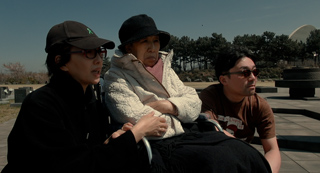Soup and Ideology
(Soup to ideology) JAPAN, KOREA / 2021 / Korean, Japanese / Color / DCP / 118 min
JAPAN, KOREA / 2021 / Korean, Japanese / Color / DCP / 118 min
Director, Script, Narration: Yang Yonghi
Photography: Kato Takanobu
Editing: Baekho JJ
Music: Cho Young-wuk
Animation Drawing: Koshida Mika
Costume Design in Animation: Mima Saako
Producer: Arai Kaoru
Production Company, Source: PLACE TO BE, Co., Ltd.
World Sales: M-Line Distribution
The director’s third family documentary. This time, she aims to salvage the vanishing memories of her mother. Taking the form of a home movie in its gentle portrayal of typical family dissonances, the film digs out the underlying cruelty of history and seems to question the unclear nature of what we call “nation.”
[Director’s Statement] Just as I thought I might never shoot another documentary, my mother started telling me about parts of her life she had never mentioned before. As her only living family member in Japan, I had to take care of her. Though that duty felt like it was about to break me, I began visiting her in my childhood home, ostensibly to make a record of her memories. We had a history of endless quarreling, our values and personalities entirely at odds, but this time I met her through the medium of the interview. Her recollections were directly connected to Korean history, dredging up the enormous tragedy of the Jeju April 3 Incident, which she experienced at age 18. In the process of going back and forth between what she remembered personally and the larger story of history—of her having been born before the Peninsula was divided in two, and of how my parents chose the “North” as their homeland even though they were natives of the “South”—I began to feel as if I was magnifying and inspecting that backdrop through a microscope.
I only had a vague knowledge of the Jeju April 3 Incident that began in 1948. My father, who was born on Jeju Island, came to Japan in 1942, while my mother was born in Japan. So, at most I imagined distant relatives or childhood friends of my father’s may have died there. I would never have guessed in a million years that my 18-year-old mother had been caught up in the middle of it.
My mother stayed alive by blocking off her memories. And while she was recalling nightmares that had been silenced in the depths of her heart, she spoke sometimes in apparent pain, and sometimes more sternly and bluntly. She told me of her first love bashfully, but with pleasure at the memory. No sooner had she told me candidly about sending her three sons to North Korea, then she succumbed to Alzheimer’s and lost her memory, as if saying, “The rest is up to you.” I felt like it wasn’t that I had been told the story, but in fact had been entrusted with it.
Twenty-six years have passed since I first took a camera in my hand with the intention of making a documentary about my family, and somehow I’ve ended up with a three-part work. You might call this film the final chapter in the story that began with my first film, Dear Pyongyang. The title Soup and Ideology refers to my belief that even if we have different values or ways of thinking, we should eat and live together without killing one another. The single story of one movie shouldn’t necessarily be of any consequence to anyone. And yet, I want to believe that even a lone film can aid in understanding what is going on in the world, or help people to reconcile with one another. I am eager for my films to be a positive force for as many people as possible.
Born in Osaka, Yang Yonghi received her master’s in media studies from the New School in New York. Dear Pyongyang (2005, YIDFF 2005), her debut film about her family with her father as the main character, has won many awards, including the NETPAC Award at the Berlin Film Festival and the Jury Special Award at the Sundance Film Festival. Sona, the Other Myself (2009), which depicts the growth of her niece, was also shown at prestigious film festivals including the Berlin Film Festival. Her debut feature film Our Homeland (2012) again won many accolades, including the CICAE Award at the Berlin Film Festival. Her books include the non-fiction Ani Kazoku no kuni (Our Homeland – Brother) and the novel Chosen daigakko monogatari (Korean University Story).
